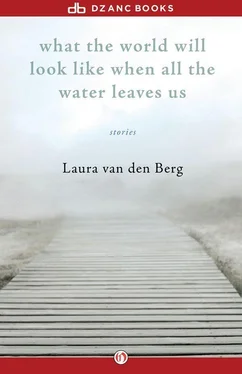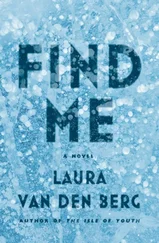The familiar weightiness came over her. She thought of finding Cole’s notes, of holding the curls of paper in her hands and failing to interpret his secret language, and wondered if she was making the same mistake with Fredrick’s drawings. Her husband and her student, it seemed, had been talking to her in the same way. It was something foreign and inaccessible and she wasn’t at all sure she wanted to keep trying to listen.
Juliana heard footsteps and shone the light around the cave, but couldn’t find Leon. She shouted into the tunnel, first in French and then, out of some hidden instinct, in her native language. The echoes stunned her — she couldn’t recall ever really listening to the sound of her own voice. She took one last look at the drawings, then started toward the gate and the garden and the cobblestone house across the road. She pointed the light at the floor; the walls and ceiling went black. She kept going until sunlight spilled down the path and she saw the entrance. Leon stood underneath the arch, facing away from her, hands in his pockets. She stopped and turned off the flashlight. She wanted to know what the woman had said, every word, as though she needed to hear it aloud in order to set forth in a different direction. The sunlight was warm against her face and arms; dust had stuck to her skin. She held her poppy-stained hand like a wound, feeling at once dazed and urgent. She tasted salt and dirt in her mouth. Before she could call to him, he turned to her and asked if she understood what he had wanted her to see. “Oh, yes,” she said, stepping toward the mouth of the cave.
what the world will look like when all the water leaves us

Madagascar was not the first expedition on which I had accompanied my mother. We’d started traveling together the year I turned seventeen, after my father called from Alaska to say he wouldn’t be returning from his ice-fishing trip and my mother, a biologist who specialized in rainforest primates, told me it was time I saw the world.
As we landed in Fort Dauphin, south of Madagascar’s capital, the morning sun blazing copper through the small windows, my mother told me to stop calling her Mother and to start calling her June , adjusting her oversized black sunglasses as she explained Mother made her feel old and undesirable. In the year without my father, the same year she turned forty-five, her age had appeared on her face like a terrible secret. The delicate half-moons underneath her eyes hardened and crinkled, lines emerged on her forehead. Her hair grayed, though she’d dyed it blonde to cover the evidence. It was even startling to me, the person who saw her day after day. Sometimes I wondered if she wasn’t in Madagascar to research deforestation and lemur populations for her latest book, but to charge through the vines and bushes in hope of finding some fountain of youth, to splash river water on her face and paste mud against her skin; to look for a cure.
My mother was a leading expert on primate habitats and a tenured professor at Cornell, although she’d been on sabbatical since my father left. Antananarivo University’s biology department, concerned about the drop in lemur populations, was funding her Madagascar expedition. She had a theory that the lemurs, who consumed much of the fruit in the rainforests and buried the seeds after eating, were trying to re-plant their damaged habitats, but since lemur populations were lower in deforested areas, the rainforests would never regenerate without the lemurs there to plant the seeds. This theory, she had told me, would be the centerpiece of her next book.
After landing, we entered a black taxi and my mother directed the driver to Hotel Le Dauphin, where we would be staying for the next twelve weeks, on the island’s eastern tip. D’accord , the driver answered. Nearly everyone in Madagascar spoke French, though my mother had taught me some basic Malagasy on the plane. Outside the airport, the taxi lurched down a pot-holed road, jostling us in the backseat. Such was the nature of travel in these remote corners, but my mother loved it all, the frantic car rides, getting off the plane and going right out onto the tarmac, the sky opening before her, dangerous and romantic.
By the time we embarked on the Madagascar trip, I’d been on sabbatical from high school for nearly a year and had given a lot of thought to what I wanted to do with my life. Somewhere between our first trip together — in the past year, we’d been all over South America and to New Guinea — and arriving in Madagascar, I’d decided to become a long-distance swimmer. I first saw the ocean in my tenth year, when I visited Montauk with my parents, who dressed me in flippers and goggles before sending me into the Atlantic. I remembered turning around, the water closing over my shoulders, and waving to my parents, their distant silhouettes blending together on the shore. It was the only time I recalled them standing so close. After Montauk, I started taking lessons at the YMCA and, in high school, joined the swimming team. By the time I started traveling with my mother, I’d accumulated a bedroom full of trophies.
I didn’t see open water again until I spent a month in Uruguay, near the southern Atlantic. After my father announced his plans to stay in Alaska, my mother collected me from the high school I attended in upstate New York on a December afternoon, my hair still wet from swimming practice, and instructed me to pack a suitcase for Uruguay. Travel light, she’d said, and bring some bug spray. It was the first trip I took alone with my mother, who was there to study marmosets with a South American scientist named Alfonso. We stayed in a village inn outside the port city of Montevideo. I had my own room and only a few nights passed before I heard Alfonso’s voice next door and my mother’s laugh rising and falling like an echo. I spent my days on the village outskirts, staring at the marmosets she and Alfonso trapped in the rainforest for observation, small creatures that thrived on leaves and insects and had plumes of fur for tails. I ate eggs and sweetbreads and let the boy who sold empanadas slip his hands underneath my shirt. Some nights, I sat outside for hours and watched the river rush behind the inn.
During those days, there was so much I didn’t know. I hadn’t yet traveled to Argentina in a small airplane that shuddered as it swept over emerald-colored fields. Or returned to South America after only a few days of being back in upstate New York, of sleeping in my own bed and pocketing eyeliner from the neighborhood drugstore, because my mother’s contact had called to tell her that after a logging company deforested a primate habitat, the marmosets started pushing each other from trees, and she wanted to see it for herself. I didn’t yet know what it felt like to be too jet lagged to sleep or eat, to get bitten by a jumping viper and have a medicine woman suck the poison from my arm, to have boys throw empty beer cans at my bare legs because I was young and foreign and wouldn’t let them lead me into a windowless room with a door that locked. Or to watch my mother disappear into the dark canopy of a rainforest and wonder if she would ever come back. Whenever I had confessed my worries, she told me that if you can keep brushing against death, little by little, fear will become a memory and you’ll be able to face anything.
In the taxi, my mother pointed at a tall, crusty tree. “That’s a triangulated palm. They’re endangered, Celia, like everything else on this island.” Then she described the lemurs I would see in the rainforests outside Fort Dupain: Black-and-Whites, Makis, Sifakas, Indris. “And in a few days, we’ll meet Daud, a zoologist from Antananarivo University,” she continued. “He’s coming all the way from the capital to work with me.”
Читать дальше













